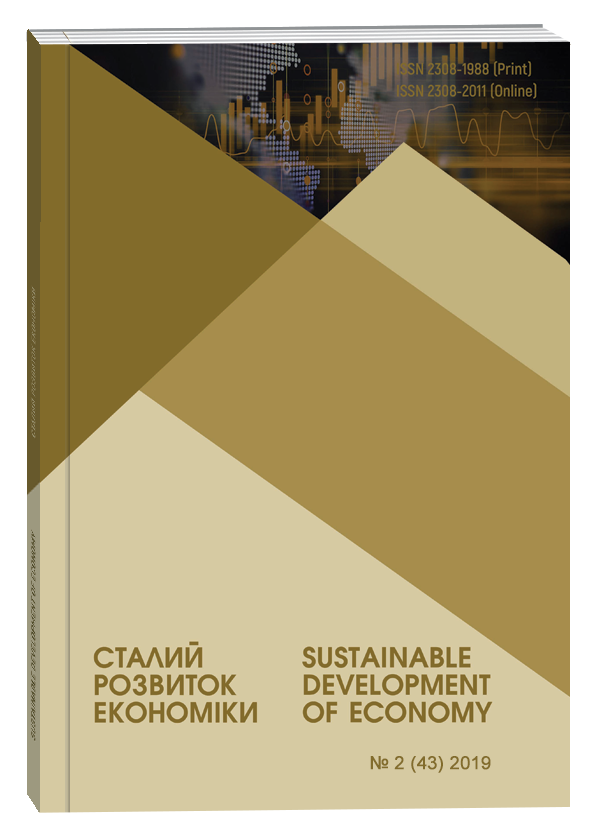DETERMINATION OF STRUCTURAL-FUNCTIONAL COMPONENTS IN THE DIGITAL ECONOMY SECTOR
Abstract
Purpose. The aim of the article is the determination of the main elements of the structure of the digital sector and its main functions in the overall system of economic development of the country. Methodology of research. General scientific and special methods are used in the process of research: theoretical generalization – to characterize the resource, research, financial and investment support; definition of subjects, objects, constituents and structural elements of the development of the digital economy, analysis and synthesis – for the synthesis of structural and functional components of the digital economy, graphical – for the visualization of the main structural and functional components of the digital economy. Findings. The basic aspects of the development of the digital economy are revealed. For the first time, elements of the structure of the digital economy sector and its main functions in the overall system of economic development of the country are structured. The interrelation of the digital economy with other areas is established and the need to use products that are produced and implemented by the digital economy to improve internal and external business processes. The need for institutional and resource support for the steady and continuous development of the digital sector has been identified. The need for sufficient financial and investment provision of this sector of the economy is proved. Originality. The structural-functional components of the digital economy sector are determined, and for the first time it is indicated the need for the formation of institutional and legal principles that are integral components of the development of the digital economy. Practical value. The analysis of the structural and functional components of the digital economy sector will allow us to set up a mechanism for introducing new technological and innovation changes that will radically change the functioning of the traditional branches of the economy and finance, education, science, healthcare, transport and communications, social life of the country and public administration. The digital economy is a supplier of modern digital systems and communications, platform software and networks; provides the formation and development of digital communication and communications platforms between business, consumers and the state. It serves as a catalyst for innovation, integration, globalization processes, expansion and deepening of trade and economic relations, the implementation of qualitative changes in the social, social life of countries and public administration.
References
Белявцев А. Цифровизация – это фундаментальный тренд. Сибирская нефть. 2018. № 7(154). С. 20-36.
Васильців Т. Фінансово-економічні інструменти стимулювання розвитку ІТ-сфери України. Економічний дискурс:міжнародний науковий журнал. 2017. Вип. 4.С. 128-136.
Веретюк С.М. Визначення пріоритетних напрямків розвитку цифрової економіки в Україні. Наукові записки Українського науково-дослідного інституту зв’язку. 2016. № 2(42). С. 51-58.
Вишневський О.С. Проблеми стратегічного управління соціально-економічним розвитком України із урахуванням процесів децентралізації. Вісник економічної науки України. 2016. № 1(30). С. 14-22.
Іванов С.В. Электронные платформы как инструмент модернизации экономики Украины. Вісник економічної науки України. 2017. № 1. С. 47-53.
Куприяновский В.П. Цифровая экономика – умный способ работать. International Journal of open Information Technologies. 2016. №4 (2). С.47-55.
Ляшенко В.І. Цифрова модернізація економіки України як можливість проривного розвитку: монографія. Київ: НАН України, Інститут економіки промисловості, 2018. 252 с.
Руденко М.В. Цифровізація економіки: нові можливості та перспективи. Економіка та держава. 2018. № 11. С. 61-65.
Beliavtsev, A. (2018), “Digitalization is a fundamental trend”, Sibirskaianeft,no. 7 (154), pp. 20-36.
Vasyltsiv T. (2017),“Financial and economic tools for stimulating the development of the IT sphere of Ukraine”, Ekonomichnyi dyskurs: mizhnarodnyi naukovyi zhurnal, Iss. 4, pp. 128-136.
Veretiuk, S.M. (2016),“Determination of priority directions of the development of the digital economy in Ukraine”, Naukovizapysky Ukrainskoho naukovo-doslidnoho instytutu zviazku, no. 2 (42), pp. 51-58.
Vyshnevskyi, O.S. (2016), “Problems of strategic management of social and economic development of Ukraine taking into account decentralization processes”, Visnyk ekonomichnoi nauky Ukrainy, no. 1(30), pp. 14-22.
Ivanov, S.V. (2017), “Electronic platforms as a tool to modernize the economy of Ukraine”,Visnyk ekonomichnoi nauky Ukrainy, no. 1, pp. 47-53.
Kupriianovskiy, V.P. (2016), “Digital economy is the smart way to work”, International Journal of open Information Technologies, no. 4(2), pp. 47-55.
Liashenko, V.I. (2018), Tsyfrova modernizatsiia ekonomiky Ukrainy yaki mozhlyvist proryvnoho rozvytku [Digital modernization of the Ukraini an economy as an opportunity for break through development],monograph, NAN Ukrainy, Instytut ekonomiky promyslovosti, Kyiv, Ukraine, 252 p.
Rudenko, M.V. (2018), “Digitization of the economy: new opportunities and prospects”, Ekonomika ta derzhava, no. 11, pp. 61-65.


